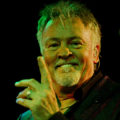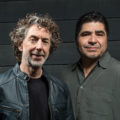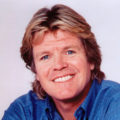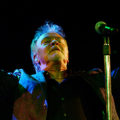Ultravox leader and Band Aid organizer Midge Ure launches “Backstage Lockdown Club”
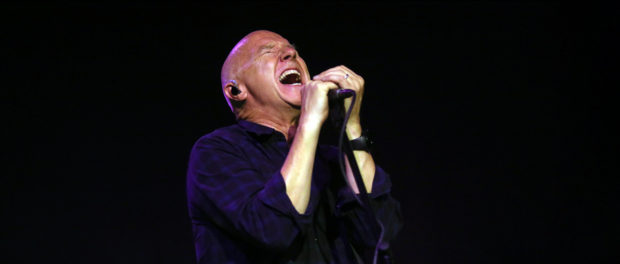
The amount of songs and stories in the memory bank of seasoned solo artist Midge Ure extend well beyond the contents of his latest compilation, “Soundtrack: 1978–2019.”
After all, he started out on the synthpop scent of Visage (“Fade To Grey”), set new wave trends with Ultravox (“Vienna”) and logged a stint with classic rockers Thin Lizzy (“The Boys Are Back In Town”).
That’s not even taking into account his pivotal role organizing Band Aid and co-writing the colossal “Do They Know It’s Christmas?” to benefit famine relief, which of course morphed into the monumental all-star concerts Live Aid and Live 8.
Though he’d normally be performing a retrospective-styled show on the road right now, Ure just launched “Backstage Lockdown Club” due to pandemic-related restrictions, which as he tells Chicago Concert Reviews, gives subscribing fans an all-access pass to a virtual community that pays premium attention to detail.
Could you describe a sample of what a typical “Backstage Lockdown Club” might be like?
 Midge Ure: I’ve built a multi-camera, one-man environment in my recording studio and the “BLC” lets members into my little creative world for Q&As and performances. I wanted to create something much more than just singing into a webcam, so the atmosphere and lighting is just as important as the sound.
Midge Ure: I’ve built a multi-camera, one-man environment in my recording studio and the “BLC” lets members into my little creative world for Q&As and performances. I wanted to create something much more than just singing into a webcam, so the atmosphere and lighting is just as important as the sound.
Why did you opt for the high-end recording route rather than the homespun approach so many seem to be taking?
Ure: I have always [thought of] music and how it is presented as one thing. The sleeve is equally important as the music you put in it. I feel the same about stage settings on tours, and now the environment in which the “BLC” events happen, [with] high-quality cameras and hi-fi sound.
What do you miss most about performing live and how do you hope this will bridge the gap?
Ure: We all need something to look forward to, and for the foreseeable future, it looks like getting into the same room with an audience won’t be happening, so this is a very good second best. Nothing compares to the excitement and feel of a live concert, but this gives a different, more intimate experience.
Between “Backstage Lockdown Club” and the “Soundtrack” collection, this season seems to be about looking back on over four decades of all that you’ve created. What have you learned the most about yourself and your music throughout this process?
Ure: Looking back is always a strange sensation, but a necessary one. I have to reflect on old material in order to re-learn songs for “BLC” events. Part of what the club allows people to do is request stuff people have never heard me do, so I have to delve into the world of Spotify for that. I think sometimes I might have been too dogmatic about my productions and songwriting. But sometimes you have to be determined to follow your own meandering path so you don’t end up being manipulated by people around you and bending to their idea of who or what they think you should be.
 When you were in Visage, what was it like being part of the burgeoning New Romantic scene?
When you were in Visage, what was it like being part of the burgeoning New Romantic scene?
Ure: It was a heady time where anything went. We were allowed to make the music we wanted to make because the industry allowed you to experiment. New ideas, new instruments, new technology and the birth of the music video. It all came together at the same time.
What are you most proud of from your years in Ultravox?
Ure: I am proud of our independence, our wide vision musically, our ability to utilize a variety of musical instrumentation, electronics, rock, orchestral, etc., to make a sound that was so identifiable. Also, the use of graphics and design.
Seeing Thin Lizzy on your resume seems pretty unexpected. Give us a glimpse.
Ure: A little taste of the ‘70s rock circuit in the USA as it started to transition to what would eventually become the new wave. I had a great time touring the US for the first time knowing I was coming home at the end to start recording the “Vienna” album. Strangely enough, Phillip Lynott, Thin Lizzy’s vocalist, was inspired by what Ultravox were doing and integrated keyboards into Lizzy.
I’m sure you get asked about Band Aid and “Do They Know It’s Christmas?” all the time, but is there anything you’re surprised people don’t bring up more often or any memories you don’t usually talk about?
Ure: I think everything about Band Aid has been covered many, many times, but I am surprised people didn’t really make the Ultravox/music connection. I played all the instruments on the Band Aid track, except Phil Collins’ drums of course, but if you listened to just the track without the vocal, it so obviously sounds like an Ultravox track.
Does it surprise you how iconic the single became or was that pretty much a given with the lengthy list of legends who turned up for the recording session?

Band Aid
Then came your principle role in creating Live Aid. What comes into your mind whenever that historic day comes up?
Ure: Organized chaos. How we managed to pull something that huge off is still beyond me. A few technical hitches, but nothing that could have ruined the event.
Describe what it felt like simply on the performance side when you took the stage with Ultravox at Wembley Stadium in London.
Ure: We tried to play four songs that didn’t rely on all the stage equipment and technology just in case it went wrong, which it used to do. Our soundcheck at the time used to take four to five hours, and at Live Aid, we had to walk on cold without one and hope everything worked. The simpler the better on that occasion.
As far as American cities go, where does Chicago rank on your list of places to perform? I imagine pretty high considering you recorded your latest live album here!
Ure: I’ve always loved Chicago…Where else on the planet do they dye the river green for St. Patrick’s Day?
For additional information on Midge Ure, visit MidgeUre.co.uk.

